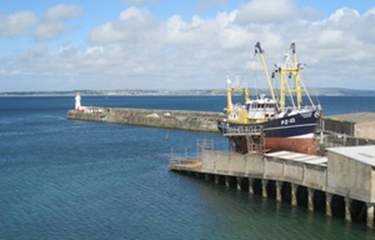The United Kingdom Marine Management Organisation (MMO) has slowed the introduction of Inshore Vessel Monitoring Systems (I-VMS) after independent testing identified issues with certain devices the organization originally said met the criteria.
The MMO plans to make carrying an I-VMS device mandatory for all vessels under 12 meters – both domestic and foreign – fishing in English waters. All vessels were pushed to install one of four approved devices, which the MMO said were “type-approved” in 2021.
However, feedback from users indicated some of the devices weren’t performing as promised, MMO Chief Executive Tom McCormack said.
“We remain committed to supporting the industry and fishers, and the feedback received last year could not be ignored,” he said.
Due to the feedback, the MMO commissioned independent testing on all approved devices to make sure that they still measured up to requirements, and at the time advised all fishes to wait until the results of the testing came out to purchase a device.
After testing the previously-approved I-VMS devices, the MMO identified that two of the four available didn’t meet test thresholds, and could not be used for the program.
“After receiving the testing results, we have now taken action to pause the I-VMS rollout and focus on supporting affected fishers,” he said. “I know this news is unsettling and I apologize for this. But we needed to take action in response to a supplier who has been selling I-VMS devices to fishers that have significant failures against the agreed device specifications.”
The program originally said four devices – The Fulcrum Nemo, Succorfish SC2, Maritime Systems MS44, and Satlink Nano – were type-approved, but testing found that the Satlink Nano and the Maritime Systems MS44 didn’t meet standards.
Maritime Systems touted the launch of its I-VMS for English fishing boats in 2022, and said it was offering the “most-competitive price” for its system in a release at the time. The company said it was working to make the rollout of I-VMS as low-stress as possible, and in an advertorial claimed it had increased the number of engineers to ensure it could meet the demand for the devices.
The revelation delays the multi-year rollout of the I-VMS further, and means that fishers with one of the two revoked devices will now have to get a new one. The MMO said it advises anyone affected to take no action until receiving a letter from the organization.
The Welsh government also put out a notice regarding the MMO’s announcement. Wales took a different approach than England and gave free AST I-VMS devices to all Welsh fishers before the legislation coming into force. The government announced it is “aware that a small number of Welsh fishers” purchased one of the inadequate devices, but added it is unable to provide any financial assistance for those fishers.
The MMO, which instead offered financial support rather than a free device, added that it plans to offer further financial support for fishers with a faulty device, so they can secure a replacement that meets requirements.
“I want to assure fishers our priority is to support affected fishers to secure replacement devices,” McCormack said. “MMO can confirm that fishers will be financially supported to secure suitable, replacement devices.”
The pause in legislation means that fishers without an I-VMS device will still be able to go fishing.
Photo courtesy of the Marine Management Organisation







